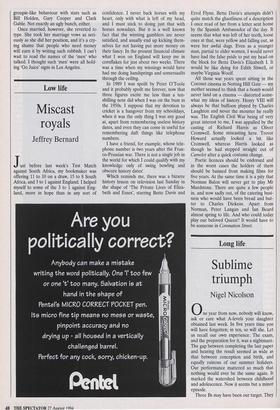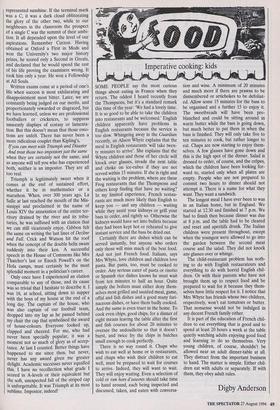Sublime triumph
Nigel Nicolson
Three Bs may have been our target. They represented sunshine. If the terminal mark was a C, it was a dark cloud obliterating the glory of the other two, while to our neighbours in the classroom the prospect of a single C was the summit of their ambi- tion. It all depended upon the level of our aspirations. Remember Curzon. Having obtained at Oxford a First in Mods and won the University's two major history prizes, he scored only a Second in Greats, and declared that he would spend the rest of his life proving the examiners wrong. It took him only a year. He won a Fellowship at All Souls.
Written exams come at a period of one's life when success is most exhilarating and disappointment most bitter. Later, we are constantly being judged on our merits, and proportionately rewarded or disgraced, but we have learned, unless we are professional footballers or cricketers, to suppress unseemly displays of ecstasy or lamenta- tion. But this doesn't mean that those emo- tions are unfelt. There has never been a more ridiculous couplet than Kipling's, If you can meet with Triumph and Disaster And treat those two impostors just the same when they are certainly not the same, and as anyone will tell you who has experienced both, neither is an impostor. They are all too real.
Triumph is legitimately sweet when it comes at the end of sustained effort, whether it be in mathematics or a marathon. When, over 300 years ago, La Salle at last reached the mouth of the Mis- sissippi and proclaimed in the name of Louis XIV the annexation of the entire ter- ritory drained by the river and its tribu- taries, he was suffused with an elation that we can still vicariously enjoy. Gibbon felt the same on writing the last lines of Decline and Fall. Crick and Watson hit the roof when the concept of the double helix swam suddenly into their ken. A successful speech in the House of Commons like Mrs Thatcher's last or Enoch Powell's on the Hola camps, must certainly be the most splendid moment in a politician's career.
Only once have I experienced an elation comparable to any of those, and its cause was so trivial that I hesitate to describe it. I was 16, at school, sitting down to supper with the boys of my house at the end of a long day. The captain of the house, who was also captain of our football team, dropped into my lap as he passed behind my chair the cap that symbolised the award of house-colours. Everyone looked up, clapped and cheered. For me, who had never been specially popular, it was a moment not so much of glory as of accep- tance. At last I counted. Better things have happened to me since then, but never, never has any award given me greater delight. Academic successes never equalled this. I have no recollection what grade I scored in A-levels or their equivalent but the soft, unexpected fall of the striped cap is unforgettable. It was Triumph at its most sublime. Impostor, indeed!



























































 Previous page
Previous page